【新唐人2011年10月26日訊】不久前閉幕的中共十七屆六中全會,強調要加快發展文化產業,推動文化產業成為國民經濟支柱性產業。學者認為,因為中共找不到任何經濟增長點了,因此把文化產業變成支柱性產業;也有學者認為,這是當前中共為擺脫國內外危機,輸出意識形態,轉移國內日益激化矛盾的做法。
大陸當局第三次提出“推動文化產業成為國民經濟支柱性產業”。
瑞典作家傅正明不認同文化產業變成國家產業支柱的說法。他認為,文化創造是精神方面的,不能用物質來考量,也不能受權利制約。
傅正明:“因為文化需要獨立的、 要自由的,不能夠是權利操縱的。作家是自由的,他們不是受國家僱用的,他們生產的是精神產品,一般的在物質上不能產生很多價值。”
大陸詩人和文化評論家葉匡政認為,中共把文化當產業,是因為經濟找不到任何增長點了。葉匡政表示,中共的文化產業只是買地、賣地或者圈地的一種,但這很危險。因為文化和實體經濟不一樣,實體經濟投資失敗還有設施和產品,文化產業失敗留下的完全只是垃圾。並且權利指導下的產業,很難獲得民眾的認同也沒有市場。
大陸詩人和文化評論家葉匡政:“從中國主流的文化可以看出,它生產的產品大部份民眾根本不歡迎或不喜歡看。如果由政府主導文化產業,最後生產的產品不僅是毫無價值的,不僅會沒有市場,而且就等於是浪費投資。”
葉匡政還指出,把文化當生意做,這種關聯很荒唐。這也說明,中共在文化領域和思想領域完全失去了指導,控制能力越來越弱,同時也破壞文化。
葉匡政:“國家扶持文化應當以資金的方式,以各種方式資助文化、贊助文化,而不是要求民眾或者社會,或者地方政府把文化當成一門生意來做。文化當成生意的話,很顯然只會損害文化。尤其在政府指導下、或在權利的指導下的文化,其實構成的是對文化的傷害。”
不過有學者認為中共危機四伏,提出的文化產業是掩蓋意識形態輸出的幌子。
美國南卡羅萊納大學艾肯商學院教授謝田表示,在國內中共危機四伏,人民與之衝突、抗暴不斷,要求自由的聲音越來越高;國際上,中共也越來越孤立。中共為了鞏固在意識形態上對中國人民思想的麻痺,同時向世界輸出黨文化的東西,提出了這套東西。
謝田:“中共所謂的文化產業是有目地的,一個是中共感覺到生存危機,生存空間越來越小,希望在國際社會上、在中國,把它的共產主義意識形態擴散出去,讓更多的人知道接受;第二點,看到了傳統文化在海內外興起,用黨文化對抗回歸傳統文化的浪潮;第三,中共“大外宣”計劃的一個組成部份。”
謝田教授表示,中共是破壞、摧毀傳統文化的最有力的實施者。
但當今的中國大陸掀起了一股傳統文化熱,“四書五經”成了眾人研學的對像、“漢服熱”;以及國際上具有中國古典特色的“神韻”藝術,影響也在不斷擴大。
看來中國人雖然經歷了中共長期的洗腦,目前也在逐漸醒悟。
新唐人記者劉惠、宋風、蕭宇採訪報導。
CCP’s Cultural Industry “Can Only Damage Culture”
The recently concluded 6th Plenary Session of the 17th
Central Committee of the Chinese Communist Party (CCP)
stressed to accelerate the cultural industry development and
to promote the culture as a national economy’s pillar industry.
Scholars attribute this to CCP’s inability to find new areas
of economic growth, thus reaching for the culture.
According to some, this is CCP’s attempt
to address the issue of the current international crisis.
With CCP’s emphasis on ideology export, the focus can be
shifted from the increasingly intensifying internal conflicts.
Mainland China authorities proposed so far three times
the idea “To Promote the Culture Industry as a Pillar Industry for the National Economy.”
Swedish writer Fu Zhengming doesn’t agree with the concept
of a culture being used as a pillar of a nation’s economy.
He believes the cultural creativity is something spiritual that
can't be measured by money or constrained by authorities.
Fu Zhenming: “Because culture needs independence
and freedom, instead of being manipulated by authorities.
Writers are free. They are not employed by the government.
Their product is spiritual and usually does not generate much material value.”
Mainland poet and cultural expert Ye Kuangzheng thinks CCP
tries to use culture as industry, as it can’t find areas for growth.
Ye said that for CCP cultural industry is just a kind of business,
like buying and selling of land, but this can be very dangerous.
Culture and economy have different consequences, as economic
failure can leave behind material issues, but cultural failure can trash the nation’s spirituality.
Moreover, cultural products guided by the authorities
cannot get people’ or market’ unanimity.
Ye Kuangzheng: “Looking at China’s mainstream culture,
most people do not welcome or like its products.
A cultural industry guided by the government will produce
worthless products without a market. It is a pure waste.”
Ye Kuangzheng also points out that it is ridiculous
to treat culture as a business.
It shows that the CCP has lost its control
over the cultural and ideological fields.
Ye Kuangzheng: “The government’s support to culture
should be in the way of funding.
The government should think how to subsidize
and sponsor cultural activities in various ways,
instead of asking the public, the society,
or the local governments to treat culture as a business.
The result of this can only damage culture. Especially under
the guidance of the government, it can only damage culture.”
However, some scholars think CCP is in crisis, thus it talks
of a cultural industry plan as to cover up its ideology export.
Professor Xie Tian of Aiken Business School at University
of South Carolina also thinks the CCP is in crisis in China.
People keep fighting, protesting and demanding freedom,
and are more and more isolated from the free world.
CCP proposes this agenda as to strengthen its brainwashing
of the Chinese people and export its “Party Culture.”
Prof. Xie Tian: “CCP’s so-called cultural industry
has its own objectives.
First, CCP feels its existence crisis, as its living space shrinks.
It hopes to export the communist ideology to the international society and let more people know about it.
Second, it sees how the traditional culture is revived overseas,
and wants to counteract this with its ‘party culture.’
Third, this has always been a component
of CCP’s ’grand propaganda’ ideolody.”
Prof. Xie expressed the concern that the CCP is the most
powerful destroyer of the traditional Chinese culture.
Currently, a wave of traditional culture pursuit exists in China.
Confucius classic works have entered research areas.
The influence of “Traditional Chinese Costume” and the
internationally renowned Shen Yun Performing Arts group showcasing traditional Chinese culture are expanding.
It seems that the Chinese people, brainwashed by the CCP
for a long time, are gradually waking up.
NTD reporters Liu Hui, Song Feng and Xiao Yu
看下一集
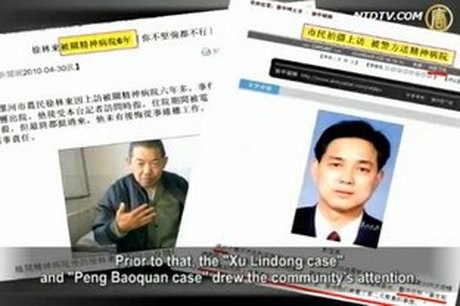
【禁聞】精神衛生法草案難止「被精神病」

【禁聞】「限娛令」出臺 央視受寵

【禁聞】“倒閉潮”懸頂珠三角

【禁聞】中共反恐定義擴大化 被指打壓維權

【禁聞】後小悅悅 中國需要的是甚麼?
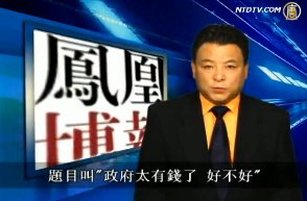
【禁言博客】政府太有錢了,好不好?

【禁聞論壇】“我們老了,誰來養我們?”
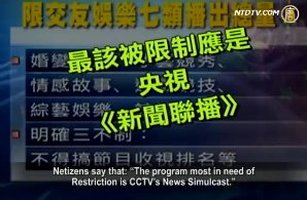
【禁聞】限娛令引輿論沸騰 廣電自稱黨喉舌
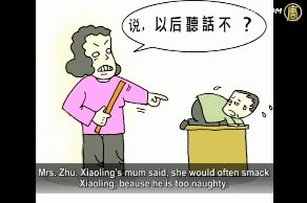
【禁聞】驚心!陸6歲童愿望是殺死媽媽
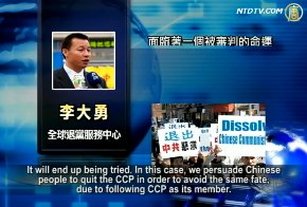
【禁聞】學者為中共開藥 專家:重疾難治
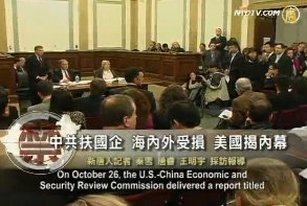
【禁聞】中共扶國企 海內外受損 美國揭內幕

【禁聞】中國暫停稀土生產 引發國際問題

【禁聞】浙抗稅民眾指武警打死人 當局否認

【禁聞】陸軍警訓練 對付訪民 機密視頻洩漏

【禁聞】中國的法律體系 能保障人民自由﹖
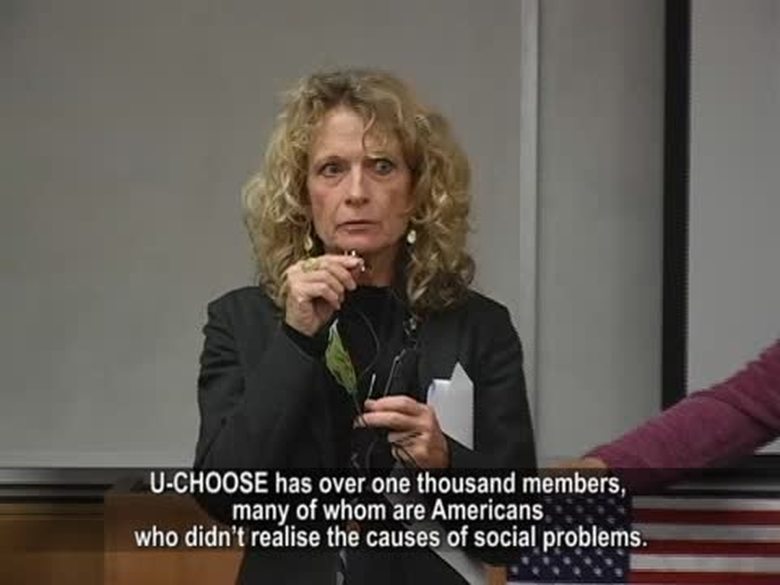
【禁聞】美國民眾拋棄高福利共產主義








